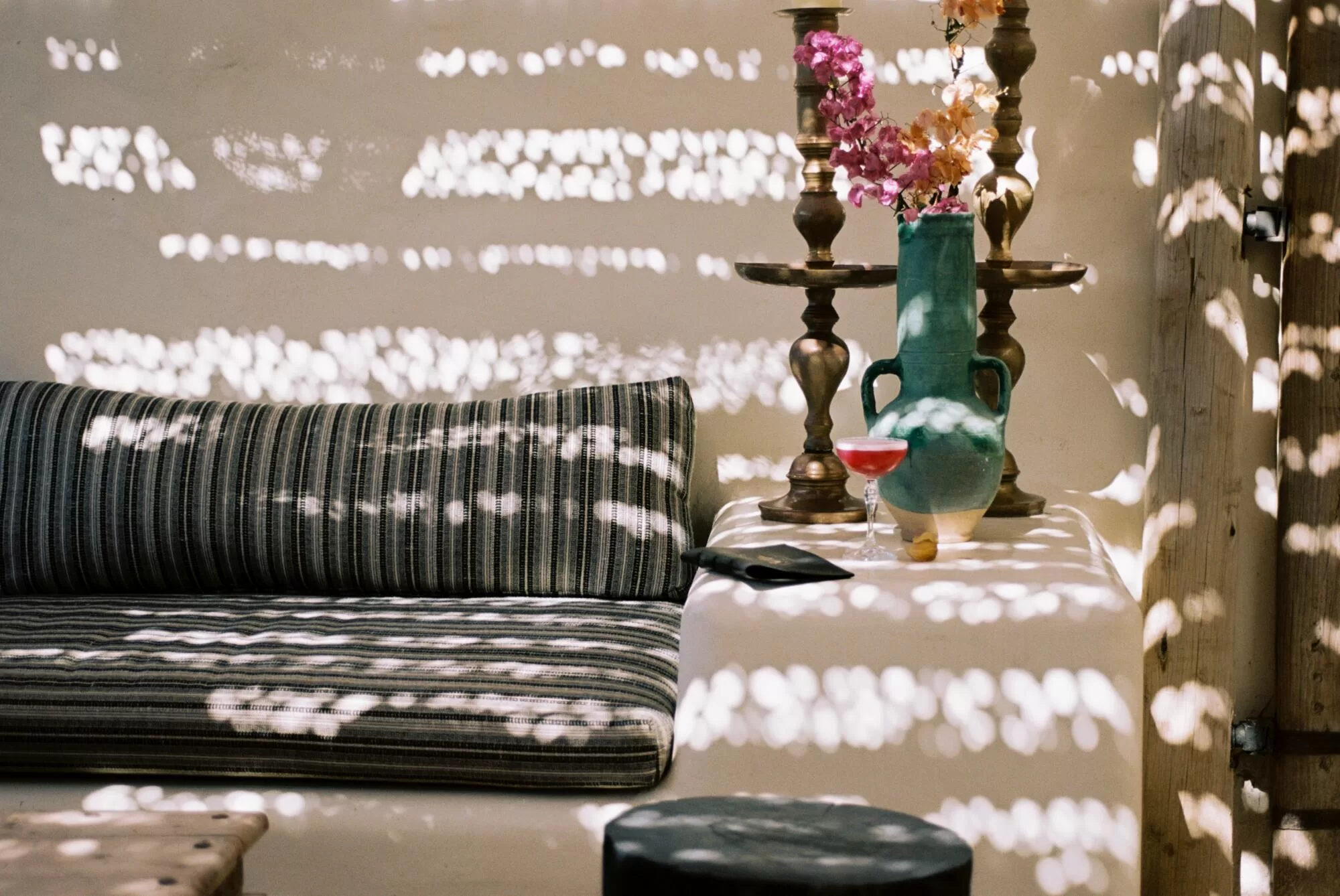The first two surprises, as you roll up Old Highway 80 into this dry and silent Sonoran Desert town, might be the steam and the music.
The steam rises from two pools at the recently reborn Jacumba Hot Springs Hotel. The music seeps from a bathhouse ruin where the hotel stages weekend performances.
On this night it’s a torch song from long ago, sung by an acoustic duo for a small, rapt, eclectic audience — hipsters in their 30s, retirees in their 70s, desert rats and spa seekers, all sitting under the open sky as night falls on the roofless building, a few million surrounding boulders and a long, tall fence that runs into the hills.
These are features that California daydreams are made of, and this emergent scene is luring visitors to an outpost 70 miles southeast of downtown San Diego.
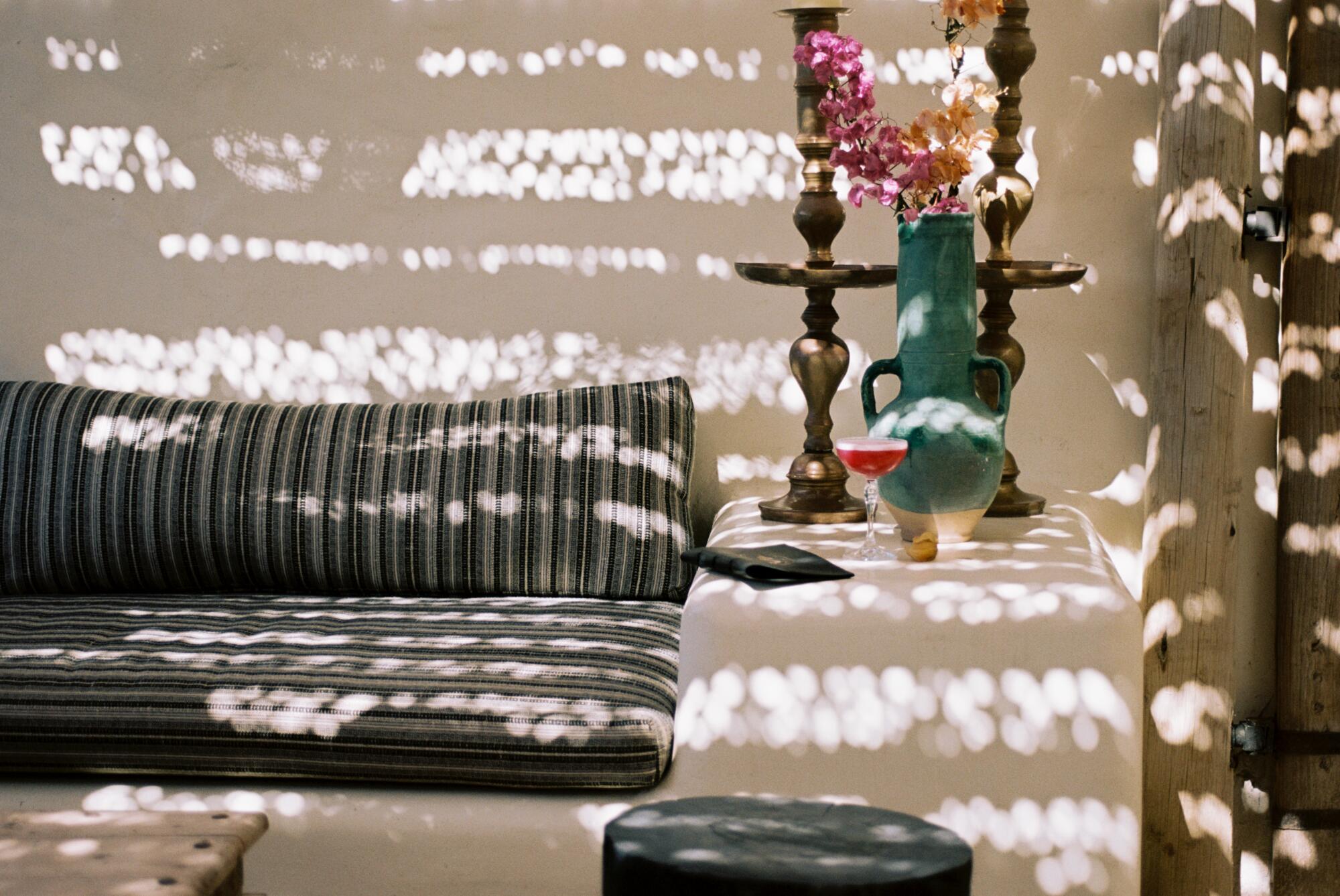
Bar patio area of the Jacumba Hot Springs Hotel.
(Pia Riverola)
“It’s a refuge from the stressors of the city. Things seem to wash away here,” co-owner Melissa Strukel said recently.
Now, a few more surprises: The town of Jacumba Hot Springs has been down on its luck for decades. That long fence, 2,100 feet south of the hotel, is the Mexican border, where undocumented migrants pass regularly and a crisis flared last year. And the hotel’s owners are new to town and the business.
“Everything is the first time,” Strukel said.
It was four years ago, early in the COVID shutdown, that Strukel, a veteran San Diego designer and special-event rental entrepreneur, decided to take a drive.
She wound up in a town she’d never noticed before, standing outside a bedraggled old motel, smitten.
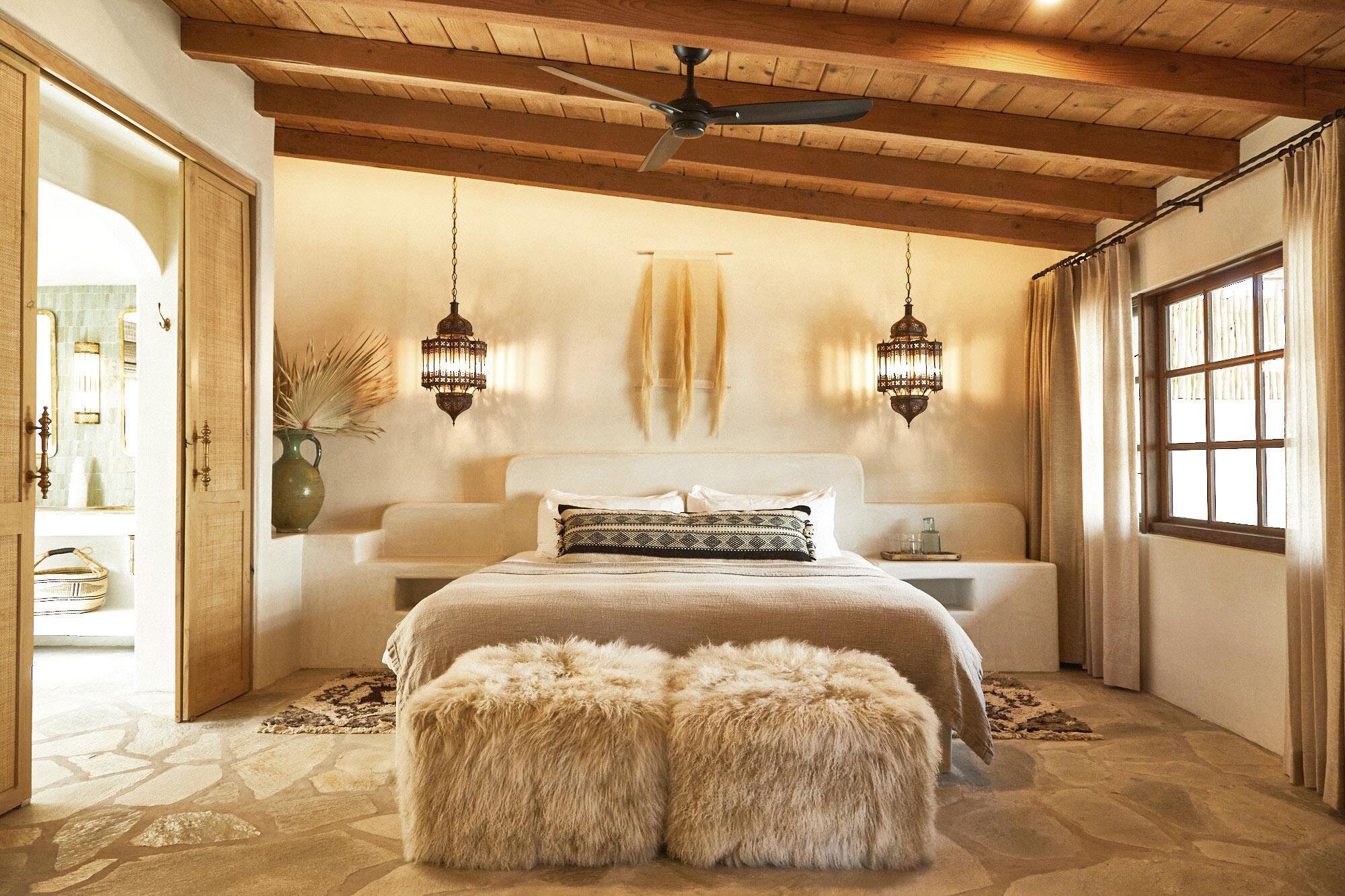
Siren Suite 11at the Jacumba Hot Springs Hotel.
(Mikael Kennedy)
So smitten, in fact, that she climbed over a wall to get a better look.
“I just knew right away that I belonged here,” Strukel said.
Soon she learned that the motel was for sale — with a catch. The owner wanted to sell it in a 150-acre package deal with most of the commercial property in town: a gas station (without gas), several homes and storefronts, a ruined bathhouse and a littered mess that was once a man-made lake.
Undeterred, Strukel enlisted her business partner Corbin Winters and they formed a plan.
They would recruit their friend Jeff Osborne, a former client and real estate business veteran. They would make the 24-room motel and restaurant into a resort with 18 rooms, two suites, restaurant, bar and global desert vibe, drawing on influences from Mexico to Marfa to Morocco.
They would replumb the hot springs to take advantage of the alkaline water’s “silky texture,” refill the lake, recruit a veteran general manager for the hotel and use the houses as vacation rentals, including two with their own soaking tubs.
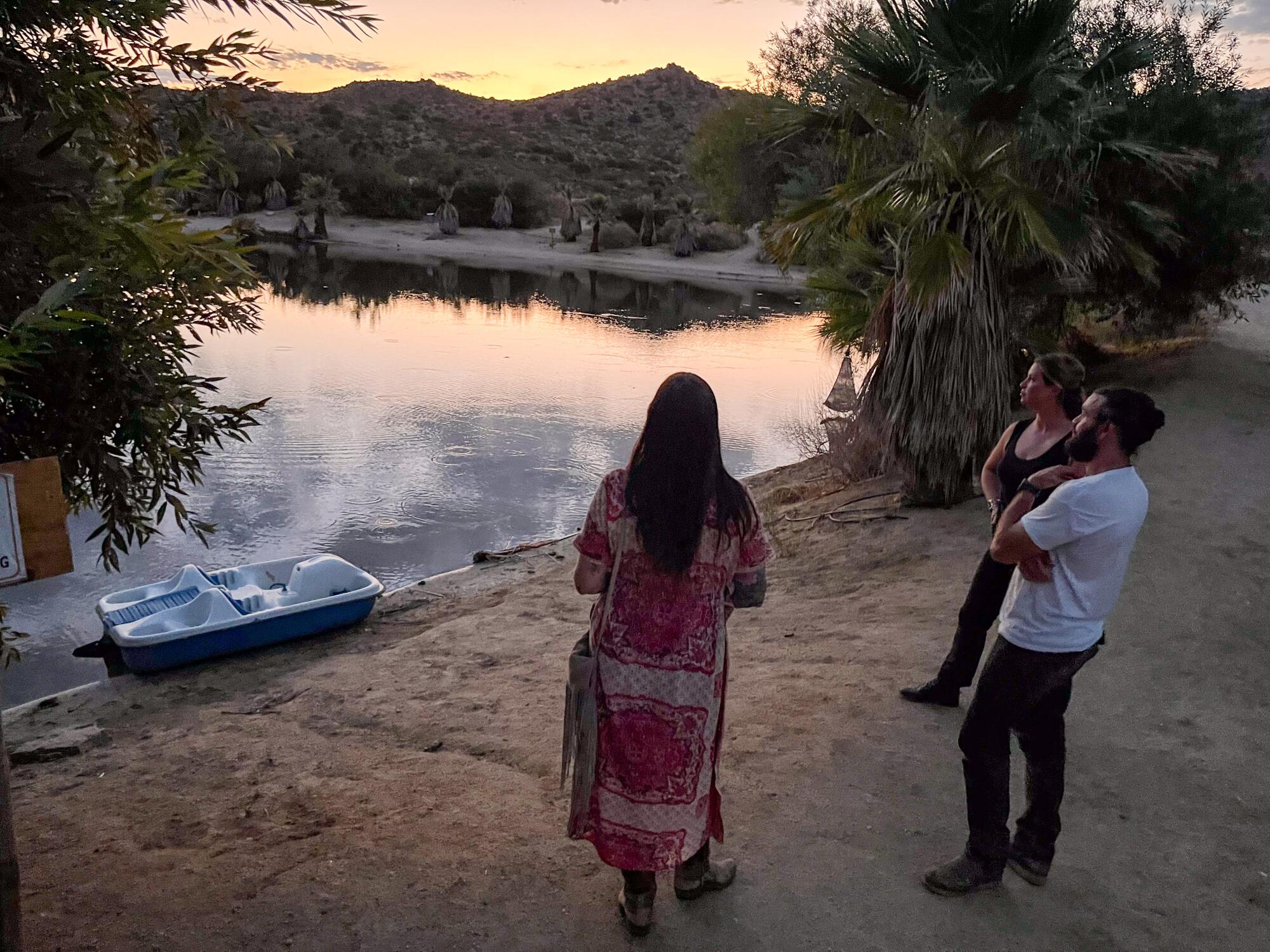
Jacumba Lake is a recently revived reservoir fed by the same springs that feed the Jacumba Hot Springs Hotel. The hotel’s owners worked to refill the lake and plant the shoreline with palm trees.
(Christopher Reynolds/Los Angeles Times)
They would build a new sense of community in Jacumba Hot Springs, where the population is 540, the median age around 62, and the median income and property values are some of the lowest in the county. The nearest full-fledged grocery store is 45 minutes away; the nearest public school, several miles down the road; the nearest legal border crossing, an hour away in Tecate.
“At first I was like, ‘ah, no way,’” Osborne recalled.
But Osborne, 38, whose experience includes several years of house-flipping and short-term rental management, thought on it some more. He drove into town, spent a night in a tent by the lake and changed his mind.
By October 2020 a deal was done. Doing business as We Are Human Kind Inc., the trio paid more than $1.6 million — but less than $3.9 million, Osborne said, declining to be more specific.
Unlike many hotel owners, all three moved to town, taking on major roles in a community short on resources and long on characters.
“This community was the end of the line for a long time,” said Sam Schultz, 69, who lives east of town at the Desert View Tower with eight dogs and at least 12 cats.
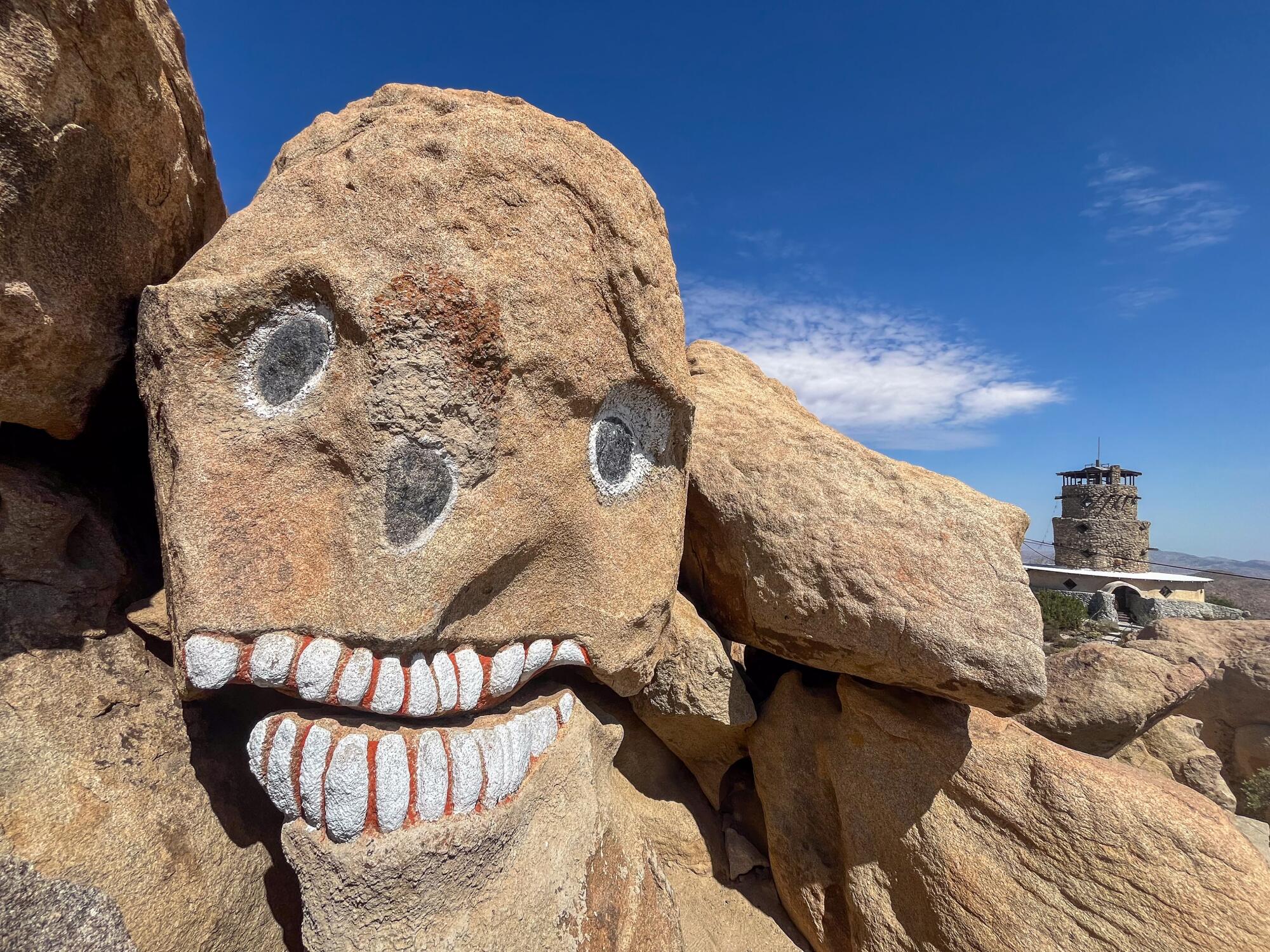
Desert View Tower was built as a tourist attraction in the 1920s.
(Christopher Reynolds/Los Angeles Times)
On any day, migrants might be illegally crossing the border nearby, breaching a fence that starts, stops and varies in height, a product of shifting politics and stony slopes.
Yet most of the time, border-crossers are quickly met and taken away by the Border Patrol agents who steadily cruise the dirt roads and highway.
“I haven’t seen one person [crossing] for a couple of weeks now,” said Osborne, who lives in a stone house on a knoll known as Snob Hill. “I live less than a thousand feet from the border … and I don’t lock my doors.”
During my two days in town, I didn’t see anyone crossing, either. But I met plenty of the neighbors.
In the Exotic Desert Hideaway — a.k.a. the hotel bar — you might bump into Roman Wrosz, a 68-year-old inventor and longtime local who flies gliders at the otherwise lonely Jacumba airport.
Along the highway east of town, you will probably encounter Coyote, a 67-year-old junkyard proprietor with a booming baritone voice and a truck that says “UFO retrieval and repairs.”
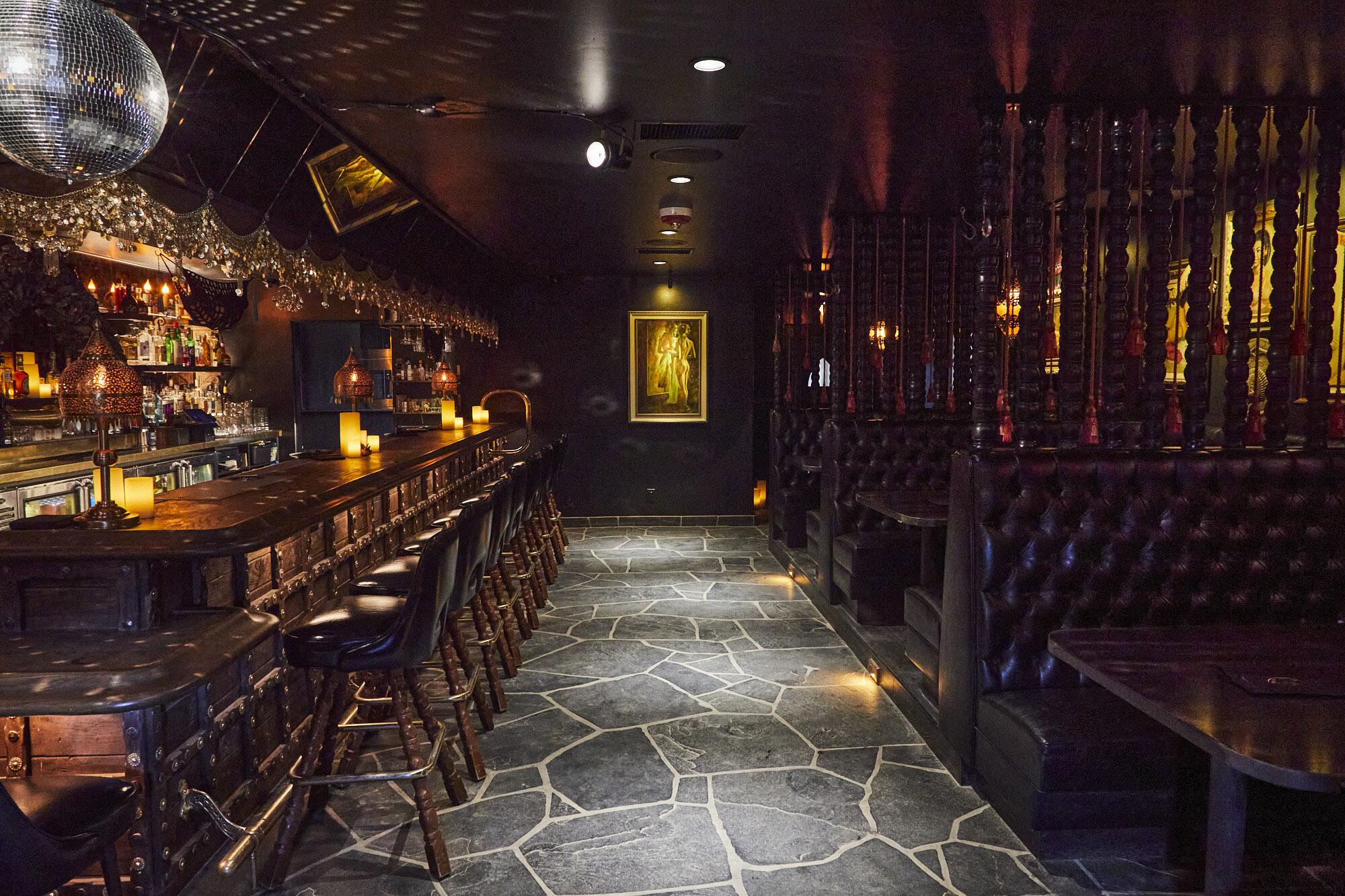
Exotic Desert Hideaway bar at the Jacumba Hot Springs Hotel.
(Mikael Kennedy)
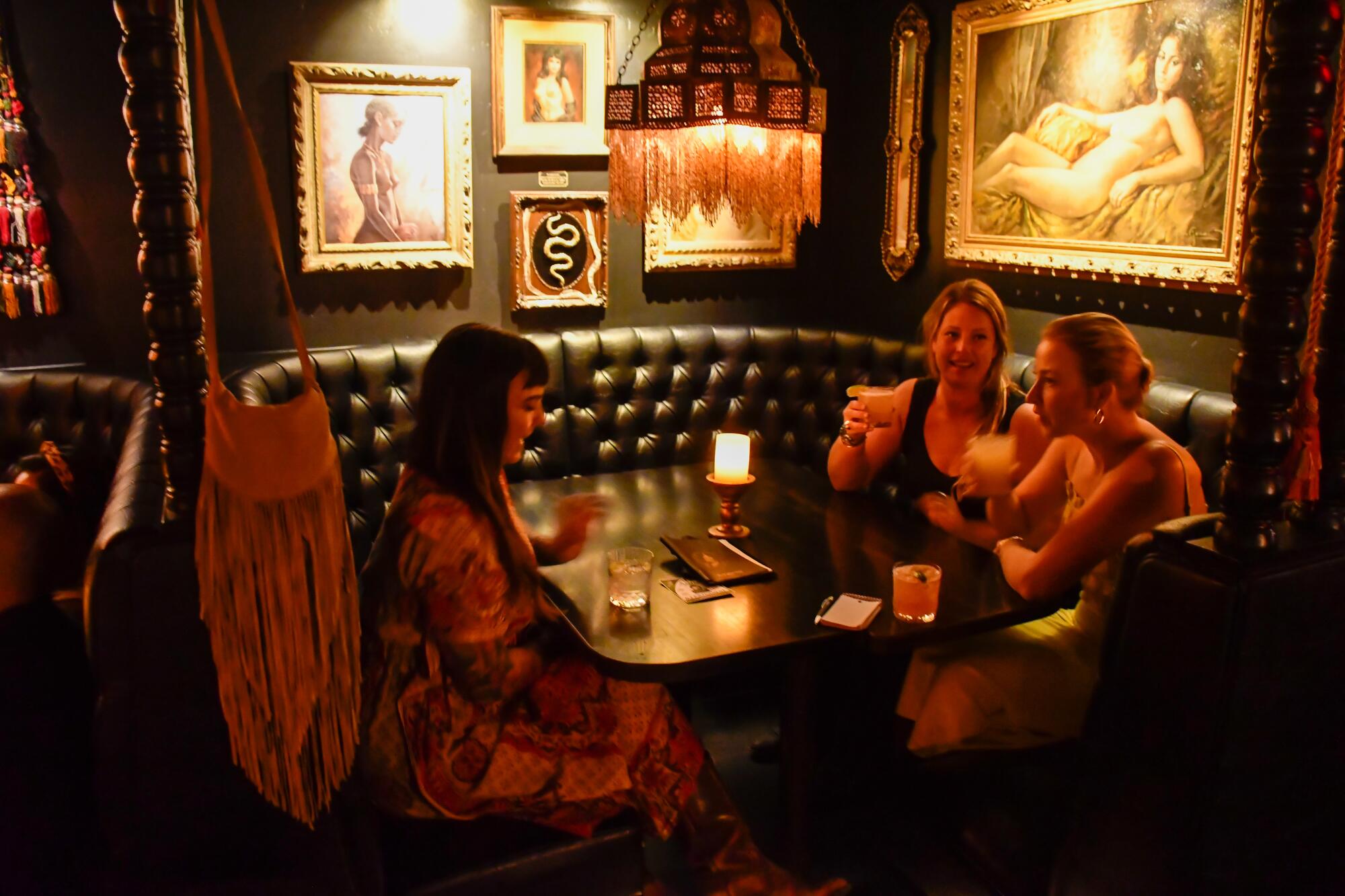
The Jacumba Hot Springs hotel includes a dark bar decorated with paintings of nudes.
(Christopher Reynolds/Los Angeles Times)
If you see a bearded man in a wheelchair working the register at Sunday breakfast in the town’s community center, that’s probably Eldon Campbell, 75, who lives in one of the little houses the newcomers purchased.
“They inherited me as tenant,” Campbell said. “They haven’t raised my rent. They put a shower in for me.”
While Campbell works the register at those Sunday community center breakfasts, Winters volunteers every other week as a server — again, not standard hotelier behavior. Osborne has signed on as the center’s board president.
“It’s magnificent, what they’ve done,” said Kirk Gilliam, a 69-year-old artist/electrician who builds robot sculptures in a gallery two doors down from the Mountain Sage market on Old Highway 80.
If the new hotel team has its way, more neighbors will arrive soon to fill open hotel jobs and take over storefront vacancies.
“This is not a flip,” said Strukel.
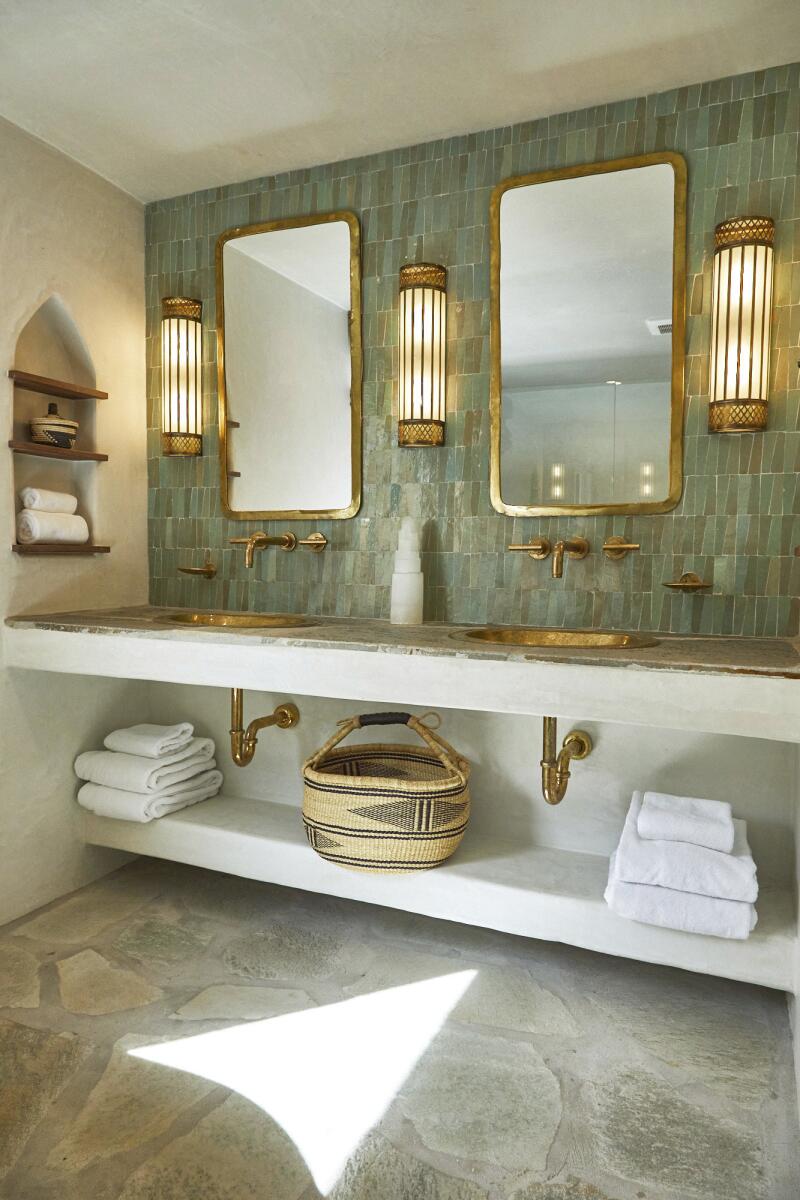
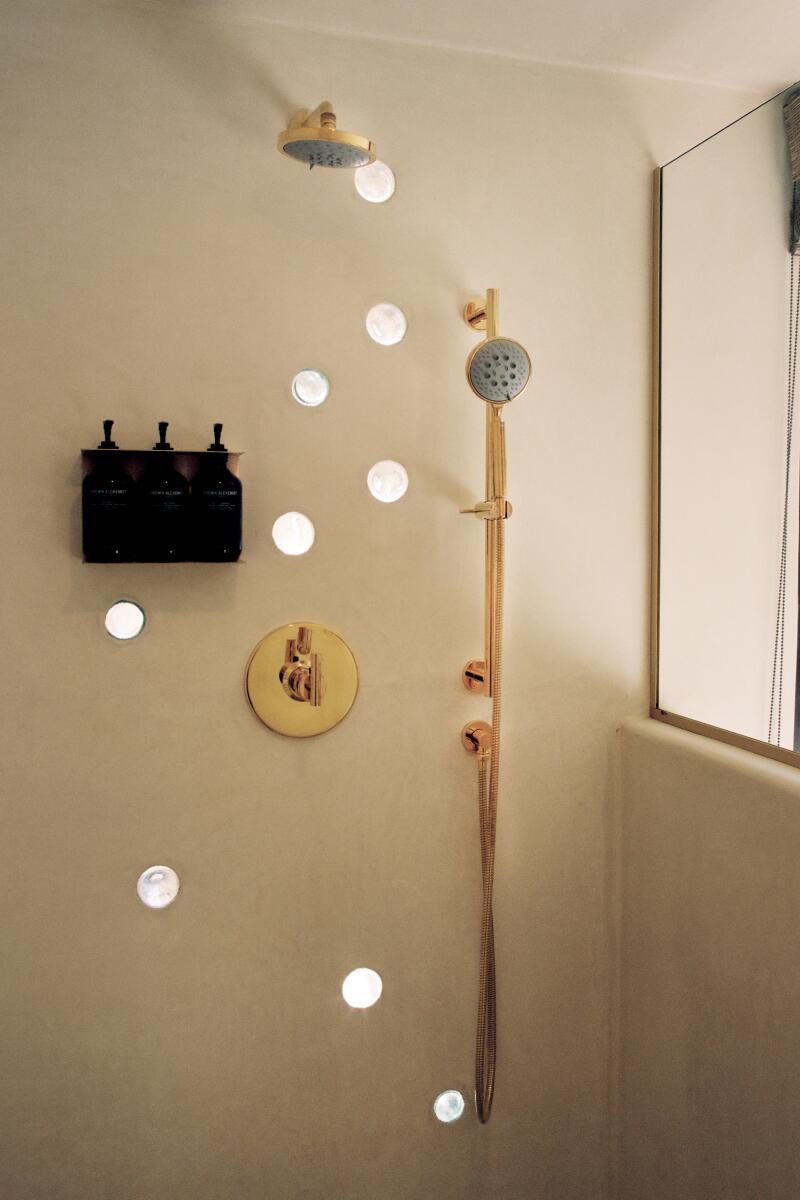
Bathroom scene at the Jacumba Hot Springs Hotel. (Mikael Kennedy; Pia Riverola)
It is, however, one of biggest changes in town since 1919. That’s when a San Diego magnate named John Spreckels opened his “impossible railroad,” running tracks through Jacumba on the boulder-filled hill-and-valley path from San Diego to Yuma.
Next came Highway 80 and speculator Bert Vaughn, who built a four-story hotel, bathhouse and a desert view tower to lure San Diego-Arizona drivers off the road. By the 1950s, a motel and man-made lake had been added.
At the town’s peak, Osborne said, “they say there were 5,000 people here on the weekends.”
But the rail line fell idle. Interstate 8 (two miles north of town) stole most of the passing traffic in the 1970s. The bathhouse and four-story hotel burned.
For a while it seemed the town’s saviors might be a pair of nudists: In the 1990s, David and Helen Landman bought an RV park outside town, converted it into a clothing-optional resort and moved in. Then in 2012, the Landmans bought and made improvements on most of downtown. But as the pandemic began, the couple’s patience ran out. They sold the hotel and most of downtown to Strukel, Winters and Osborne, then peddled the clothing-optional resort, DeAnza Springs, to other buyers in early 2021.
By early last year, the team was deep into redesign and reconstruction, and it was clear that making over the hotel and downtown Jacumba Hot Springs would cost more than buying them did.
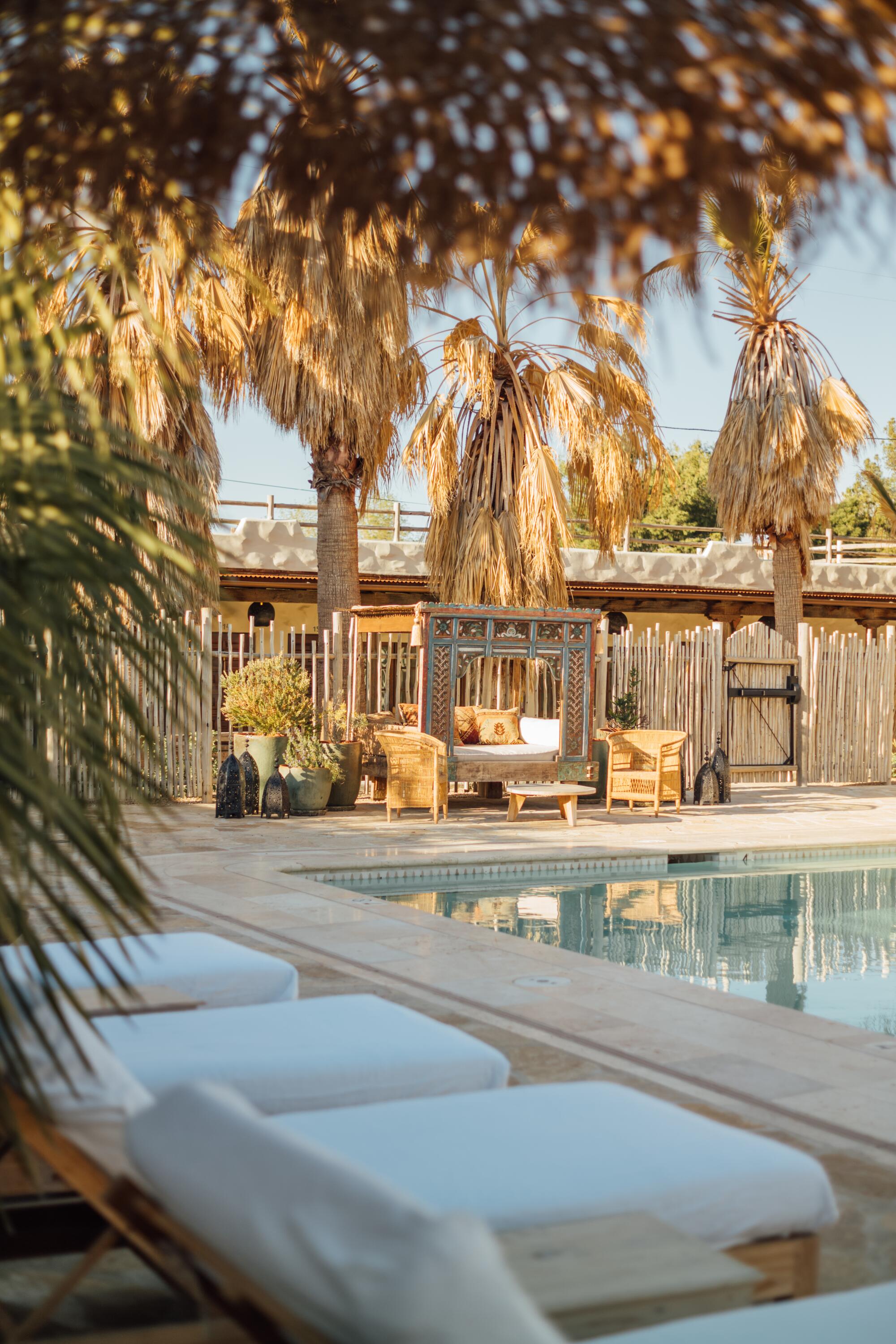
The Solstice Pool at the Jacumba Hot Springs Hotel.
(Kate Berry)
To bring back the lake, the three hired workers to spend months scraping with a tractor, consulted with the nonprofit group Indigenous Regeneration, then added about 70 California-native palm trees, which line a sandy shore.
Then the world intervened. In the space of a few spring days, hundreds of immigrants surged over and around the border fence.
Most had come from far beyond Mexico, speaking Chinese, Portuguese and other languages, apparently drawn by the expiration of Title 42, a pandemic-era public health measure that allowed authorities to turn away asylum-seekers more easily. A U.S. Customs and Border Protection spokesman said the migrants had been “callously placed [in the area] by for-profit smuggling organizations.”
Once across, the migrants gathered in three encampments and built campfires in the hills south of Old Highway 80, eager to be seen and considered for asylum, most of them without food, water or protection from the elements.
“It was two weeks of bad,” Strukel said.
While the Border Patrol decided how to respond, Jacumba locals spread the news. The hotel team set up a collection site and began to gather and distribute supplies with help from Border Kindness, a Mexicali-based nonprofit, and other groups.
“There were locals who brought out food and supplies, and there were others who hated them for that,” said Gilliam.
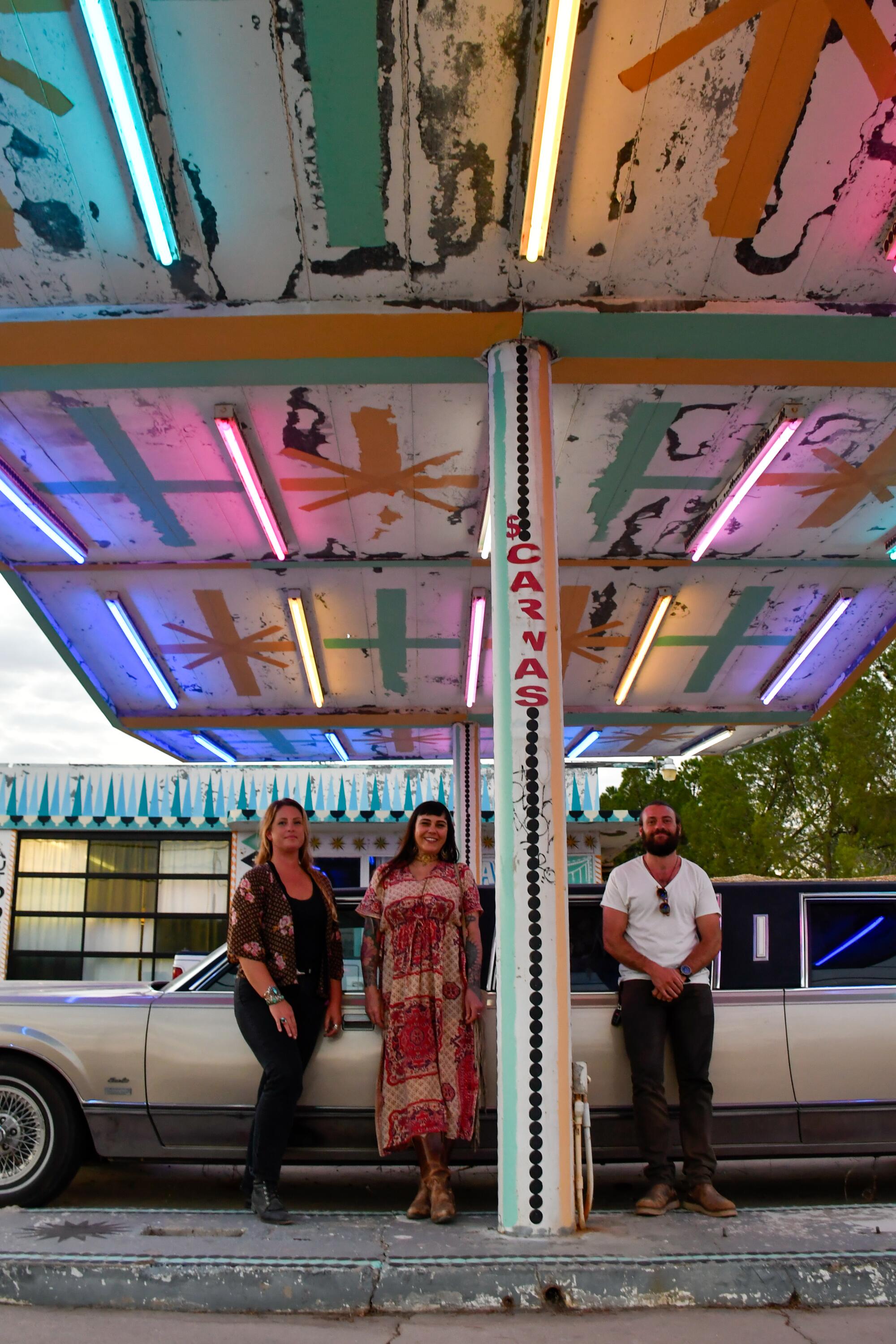
The co-owners of the Jacumba Hot Springs Hotel, seen in the old gas station that serves as their office, are (from left) Corbin Winters, Melissa Strukel and Jeff Osborne.
(Christopher Reynolds/Los Angeles Times)
The hoteliers “weren’t even open and they were using the kitchen as a place for people to bring supplies,” said Kelly Overton, executive director of Border Kindness. “There was no foreseeable benefit to them. They chose to do what they thought was the right thing. … Not everybody makes that decision when it comes to their business and their money.”
As the flow continued into 2024, the Border Patrol imposed more order and sent more buses. Then Mexico boosted its immigration law enforcement near the border and the Biden administration tightened asylum restrictions. Now, Border Patrol officials and locals agree that numbers are down again.
At the hotel, Strekel, Winters and Osborne began a gradual opening in late 2023, launching into daily operation in February, inviting newcomers to explore “an unexpected escape on the dusty edge of everything.”
Its workforce has grown to about 75 people, including general manager Natalie Richards from San Diego, chef Leo Ceja from Los Angeles and director of special programming and hospitality Juan Miron, originally from Tijuana.
I arrived on a Friday, ducking into a rustic-chic trailer that houses the front desk.
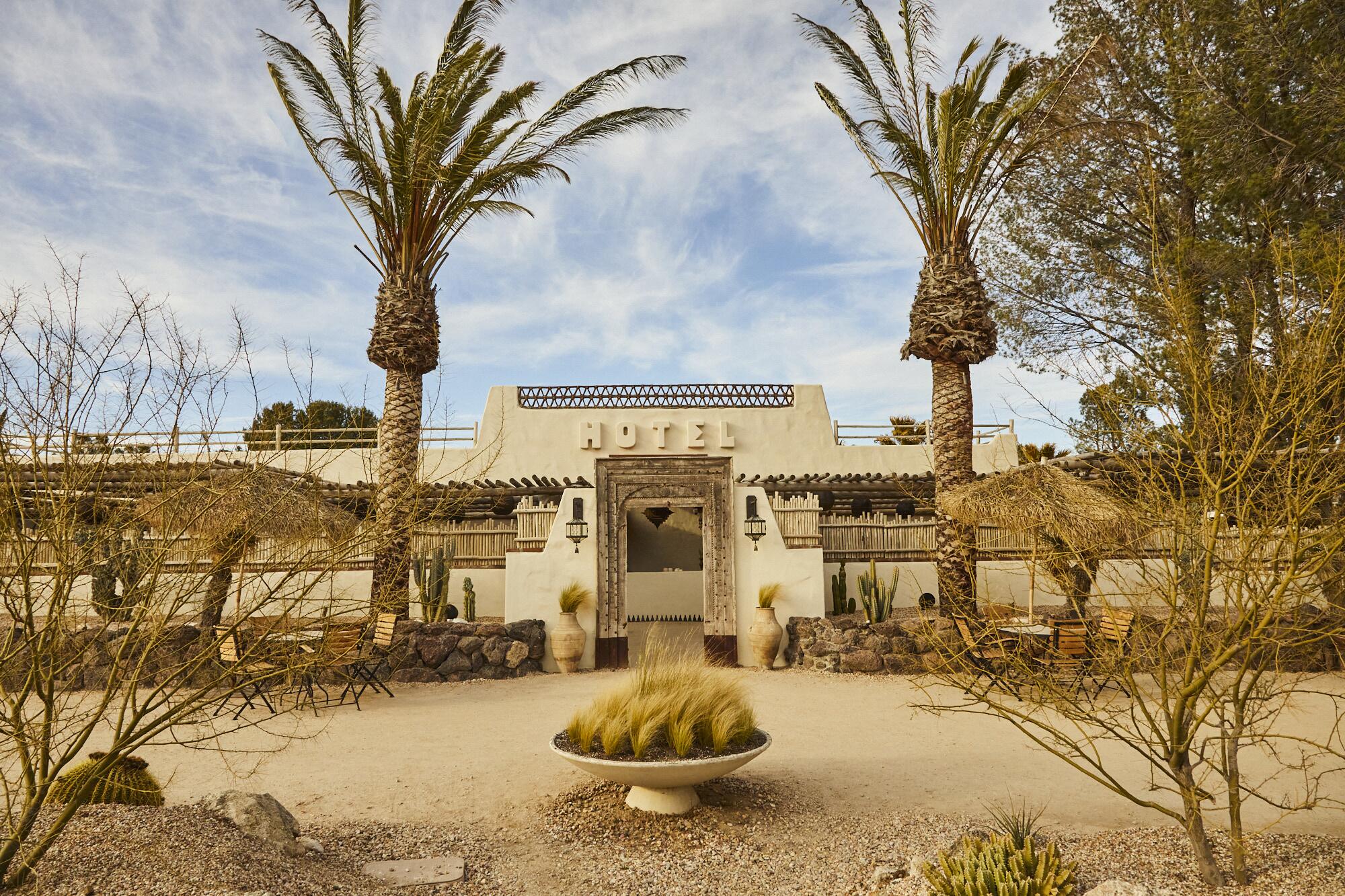
The Jacumba Hot Springs Hotel, built as a motel and dramatically reborn in 2024 as a boutique hotel, includes Moroccan design details, multiple pools, record players and curated paperbacks in guest rooms.
(Mikael Kennedy)
Beyond the Moroccan entry gate and wind chimes from Arcosanti in Arizona, every guest room features stylish tiling, a turntable and an adventurously curated selection of books and albums. (Mine included two Louis L’Amour paperbacks and albums by country crooner Charley Crockett and Ethiopian sax player Getatchew Mekuriar.)
Most guests so far have come from San Diego County, “a lot of creative professionals,” Osborne said, and “people that like things off the beaten path, that like going down dirt roads.” Rates typically start at $180 on weekdays, $360 on weekends. (The only other lodging option within five miles of town is the rustic DeAnza Springs Resort.)
That afternoon, guests lounged around the Solstice Pool and Ritual Pool (where sometimes movies are screened) or stepped inside to the warmer soaking tub in the Echo Room.
The Exotic Desert Hideaway Bar — as dim as the desert day is bright— features kitschy nudes on the walls, DJs on weekends, $5 beer during happy hour and a $78 cocktail situation known as “The Fortune Teller.” (It comes flaming in a cauldron, includes tequila and serves six.)
Down the block, Kirk Gilliam usually has his gallery open on weekends. Next to the gallery, David Lampley sells vintage clothes at the Impossible Railroad Trading Post and serves as director of auditory and visual experiences for the hotel. (If you’d like to make a mono recording on a 1938 record-cutting machine, he can help with that too.)
Out at the born-again lake, Coyote the junk dealer has contributed three kayaks and a canoe for anyone who feels like paddling. There’s no fishing, but wildlife sightings are common, including a very large cat — a black jaguar? — at water’s edge in early October.
Though the old bathhouse down the street remains in ruins, it’s busy almost every Saturday night. That’s when the hotel team dresses the roofless structure up with bistro lights and candles and invites an eclectic mix of musicians to play under the stars. Besides torch songs, sea shanties, Latino roots and rockabilly tunes have been heard.
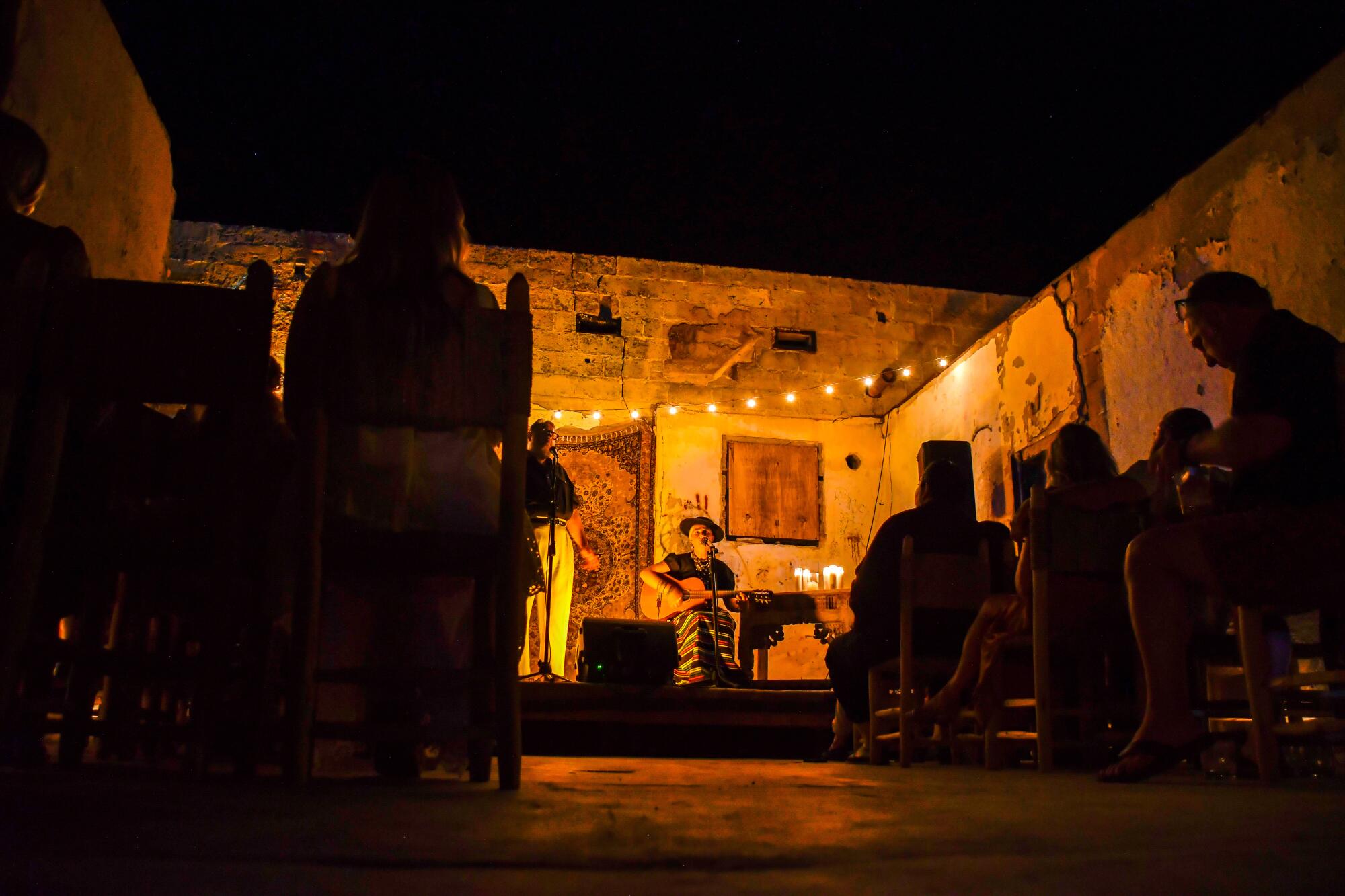
The Jacumba Hot Springs Hotel’s amenities include an old bathhouse, now without water or roof, where the hotel stages weekly candlelight concerts. The performers are Tiny and Mary, a sibling duo.
(Christopher Reynolds/Los Angeles Times)
“I’ve been coming out here since I was a teenager, and I never told anyone about it,” singer-songerwriter Mary Simich, 31, told me. “I was afraid people would ruin it.”
Now Simich, who lives in Orange County, is trying to buy a house in town.
The border remains a wild card (especially with new presidents in office or coming soon on both sides of the border). But this dusty little town is already in transition.
Strekel, Winters and Osborne say occupancy at the Jacumba Hot Springs Hotel is now running above 90%. Entrepreneur Max Daily, semi-famous in San Diego for running the pop-up Oslo Sardine Bar, has announced plans to open an eatery on Old Highway 80 with a stage for live music. Possible name: the Jacumba Yacht Club.
Meanwhile at DeAnza Springs — the former clothing-optional resort north of town — new owners Luke Wasyliu and Kevin Cho have made clothing mandatory, upgraded infrastructure and boosted a focus on wellness, glamping and weekend music festivals, including Youtopia, an October gathering aimed at devotees of Burning Man.
“It’s gentrification,” neighbor Sam Schultz said recently, sitting near the entrance of the Desert View Tower. “And a certain amount of gentrification is good for us around here.”
What to do, see and eat in and near Jacumba
Jacumba Hot Springs Hotel, 44500 Old Highway 80, Jacumba Hot Springs; (760) 766-4333. Room rates start at $180 on weekdays, $360 on weekends.
DeAnza Springs Resort, 1951 Carrizo Gorge Road, Jacumba Hot Springs; (619) 766-4301. The campground has 311 RV sites and about two dozen rental travel trailers, tiny homes, tent sites and motel rooms, two pools and a restaurant. Neighbored on three sides by Anza-Borrego Desert State Park, it also has many trails, including the scenic 1.1-mile Temple Peak Loop Trail. Hikers pay $5 each for trail access, a good bargain. Often hosts weekend music festivals.
Desert View Tower, In-Ko-Pah Road, Jacumba; (619) 971-2845. The view from this 70-foot tower is OK. The best part of the property is the neighboring trail among boulders, where someone long ago carved and painted all sort of faces and creatures. Adult admission $9.50.
Pacific Southwest Railway Museum, 750 Depot St., Campo. Open Saturday and Sunday, 9 a.m.-5 p.m. Admission $10 for adults. The museum is a place for hard-core train people, unless you’re going on a train ride (about 10.5 miles round-trip). Those are offered on Saturdays at 10:30 a.m., 1 p.m. and 2:30 p.m., at varying prices. The museum also has a location in La Mesa.
Gaskill Brothers Stone Store Museum, Forest Gate Road and Historic Highway 94, Campo; (619) 980-2013. Includes a timeline on local history. The upstairs of the stone story museum is mostly about the Buffalo Soldiers. Open Saturdays and Sundays, 11 a.m.–4 p.m.
Camp Lockett Event & Equestrian Facility, 799 Forest Gate Rd., Campo; (619) 369-9399. Including a Buffalo Soldier Museum, horse facilities and camping area. The camp, built in 1941 and closed in 1946, was the last base of operations for Black “Buffalo Soldiers” before the U.S. Army integrated and disbanded cavalry units. The Buffalo Soldiers guarded the U.S.’ southern border and Italian prisoners of war. Museum opens Saturday 9 a.m.- 5p.m., closed in December.
